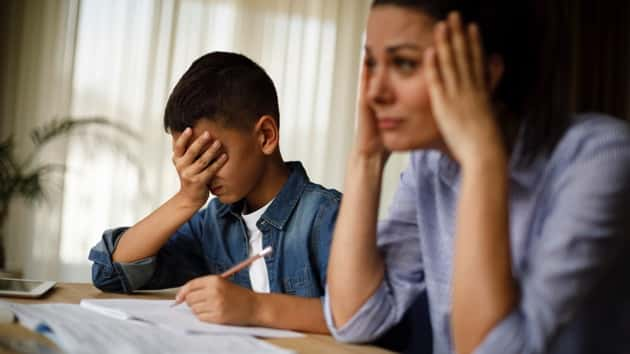
 damircudic/iStock(NEW YORK) — A mother who’s dealt with anxiety sought help for herself after she believed her fears were trickling down to her toddler.
damircudic/iStock(NEW YORK) — A mother who’s dealt with anxiety sought help for herself after she believed her fears were trickling down to her toddler.
When Tiffany Baker’s son was 3 years old he had typical toddler fears.
“He was scared of the dark, he was scared of thunder storms, he was scared of strangers,” Baker told Good Morning America.
But when Milo shared more unusual fears like worrying about the shower turning on when he was in the bath, Baker expected he was sensing her anxiety and replicating it.
“I’m an anxious flyer, I’m an anxious car rider, I’ve just been an anxious person,” she said.
To help her son, Baker decided to undergo therapy for herself.
According to research from Yale University, the best way to deal with anxiety in children is to treat their parents.
“Parents constantly reassure a child with generalized anxiety. While the responses of parents are natural, studies have shown they also leave children suffering from debilitating anxiety into adulthood,” said Eli Lebowitz, associate director of the Anxiety and Mood Disorders Program at the Yale Child Study Center and lead author of the study, which expanded into a program at Yale that counsels parents.
Baker shared her experience in the online publication Motherly writing, “the writing was on the wall: my anxiety had become a problem.”
“The wisdom I received from being in therapy was that the better option was to help him face what he was afraid of,” Baker said.
Baker said she learned mindful breathing to calm her own anxiety. She also changed her language with her son. For instance, she replaced “be careful” with “let me know if you need help.”
“I make sure I communicate to him that I believe in him, that I think he’s capable,” Baker said.
Milo is now a well-adjusted 9-year-old who takes risks and pitches for his baseball team.
Parenting expert Rachel Simmons appeared on GMA Tuesday, where she explained how children may react to the same things that make their parents anxious, after seeing modeled behavior.
“Parenting is an anxious profession,” Simmons said. “We don’t keep our kids alive by looking the other way and so we have to be a little bit easy on ourselves about the fact that we all get nervous, but I think it’s really important to do a few things.”
Simmons gave the following suggestions for parents looking to reduce the anxiety in their kids.
1. Ask open-ended questions
Don’t say, “Who was mean to you?” Instead, Simmons suggests saying, “How was your day? Who did you hang out with? Tell me something that surprised you.”
2. Try not to overreact
Don’t react from your own anxiety. “Take a deep breath, respond with intention,” Simmons said.
3. Avoid making feelings more painful
Try not to match your child’s feelings when they are upset.
Simmons said if your anxiety is keeping you from going places or attending events, it’s a sign you should seek help.
Seeing a counselor, a therapist, or joining a mindfulness/stress reduction program can help, she added.
“The best thing you could do for your child is to help yourself,” Simmons said.
Copyright © 2019, ABC Radio. All rights reserved.
